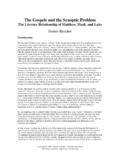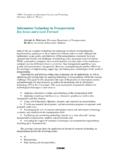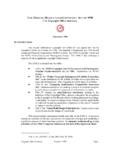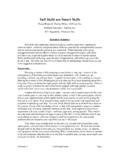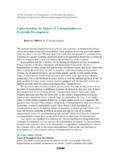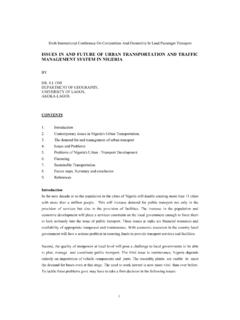Transcription of Sacred Words? or Words about the Sacred? - CRI/Voice
1 Erved CRI/Voice , Institute CRI/Voice , Institute Sacred Words ? or Words about the Sacred ? A Basic Introduction to the Issues of Text Criticism Dennis Bratcher Introduction: Taking the Biblical Text Seriously For many Christians who have not studied the matter in much detail, the individual Words of the Bible are in some way Sacred , something akin to the Words of God. Since many confess the Bible as the Word of God it is then easy to assume that the individual Words of the Bible as they are written in physical form, the Words that we can hold in our hand in a modern book, are the very Words of God (see The Word of God and God s word). In one sense, this attitude is a positive reflection of a very high regard for the authority of Scripture.
2 This is especially true among Protestants who are suspicious of ecclesiastical dogma developed from the vicissitudes of history and culture. The desire is to place Scripture as the basis of the Faith and practice of the Church rather than the decisions of Church Councils and ecclesiastical authorities. This positive dimension of a high authoritative role for Scripture is reflected in the faith statements of various church traditions. For example: 4. We believe in the plenary inspiration of the Holy Scriptures, by which we understand the 66 books of the Old and New Testaments, given by divine inspiration, inerrantly revealing the will of God concerning us in all things necessary to our salvation, so that whatever is not contained therein is not to be enjoined as an article of faith.
3 (Manual of the Church of the Nazarene, Articles of Faith, IV. The Holy Scriptures ) However, some traditions of Protestantism, and much popular Christian thinking, have taken this idea much further. They contend that the very Words of the Bible are, if not dictated directly by God, at least inspired by God (various forms of verbal inspiration; see Revelation and Inspiration of Scripture). In this view, the authority of Scripture lies in the precise Words of the biblical text. This has led to some very good work in analyzing the physical writing of the biblical text by conservative evangelicals, precisely because they make the assumption that the message of God, and therefore the line between truth and falsehood, between orthodoxy and heresy, depends on the individual Words of the Bible being correct.
4 Thus there is great incentive to recover the original Words or the autographs as they were first penned by the author. The problem, of course, is that none of these autographs exist; only many hundreds and thousands of copies made over the course of 4,000 or so years. Some church traditions want to maintain that the Bible is without any error of any kind without qualification (see The Modern Inerrancy Debate). Yet, it does not take too much work in the Hebrew, Aramaic, or Greek texts in which the biblical traditions were originally preserved to understand that at the very least there are errors of copying, spelling, and grammar throughout the Bible in both Testaments.
5 There are also verses in the Hebrew of the Old Testament that defy translation simply because they do not make any sense as they are written. This incongruity between what some want to maintain about the Bible and what can actually be demonstrated from the biblical texts themselves has been the source of much and sometimes bitter acrimony in the church in the past three or four decades. Other church traditions have attempted to deal with this obvious problem while still maintaining some form of absolute inerrancy view of the biblical text. They do this by logical deduction based on a prior faith assertion about inerrancy and declare that the original autographs must have been perfect in every way (inerrant) and were only corrupted by the process of copying.
6 This logically maintains the faith confession about an absolutely inerrant Bible while acknowledging that the form of the Bible that we now possess does, in fact, contain such physical errors. Text Criticism 2 Dennis Bratcher Of course, never dealt with in such declarations is why God would allow the Bible to deteriorate from its original perfection if he had enabled human beings to produce it without error at the beginning, or what value a hypothetical perfection of the original non-extant text has for us today. Also, modern biblical study has raised serious questions about the traditional model of a single author sitting down and writing a biblical book, a model drawn far more from modern Western notions of authorship and ownership of ideas than from the realities of the biblical world and Near Eastern culture.
7 Most biblical scholars now acknowledge that the majority of the Bible was produced in a long process of the growth of traditions over many years and centuries as the community of Faith remembered, applied, and reinterpreted their experiences amid changing historical circumstances that demanded new responses. This idea fits well with what we know about Eastern culture where the idea of authorship and ownership of ideas is totally foreign, at least until the influence of modern ideas from the West. Ideas are shared and passed down from one generation to the next in community. While there may be significant thinkers who produce new ways of viewing the world, those ideas are the property of the community as a whole and of later generations so that it is difficult to distinguish between the original and the dynamic of those ideas through the centuries (Confucius is a good example of this).
8 In applying this idea to the Bible, one noted biblical scholar commented, The Bible was not [just] written; it grew. This renders the idea of a perfect autograph less viable. We cannot really deal with the issue of autographs since they are no more than a mental construct reached by logical conjecture. What we actually have is the Biblical text in many hundreds (OT) and many thousands (NT) of handwritten manuscripts dating back over 2,000 years. If we are to take the Bible itself seriously, then it is these existing manuscripts that must be taken seriously as evidence for any conclusions we might reach. The Role of Textual Criticism in the Church Many people react to the idea of criticism of the Bible, assuming that this is something negative in the sense of disapproval or disparagement.
9 However, in its technical sense, criticism simply means the scientific investigation of literary documents (as in the Bible) in regard to such matters as origin, text, composition, character, and history (Webster s). Critical study of the Bible, then, is exercising or involving careful judgment or judicious evaluation (Webster s). A critical edition of a biblical text includes, along with the biblical text in its original languages, variant manuscript readings as well as scholarly evaluation of possible errors in the text and suggested corrections (called emendations). In its early practice, Text Criticism had as its goal the reconstruction as well as possible of the most original reading of the text before errors were introduced or before later developments changed the form of the text.
10 However, as mentioned above, to talk about an original text to some degree assumes that there was a single initial copy that has deteriorated for various reasons. Indeed, biblical scholarship has shown that some biblical traditions, such as the letters of Paul, can be traced to a single author and are, for the most part, intact and continuous (scholars speak here of the integrity and authenticity of the text). Still, we do not have any of the original manuscripts of these writings. However, most biblical traditions are much more dynamic and did not have a single author or an original stable form that can be recovered (for example, the Pentateuch; see JEDP: Sources in the Pentateuch) or existed in more than one form (for example, the books of Samuel or the Book of Jeremiah).
